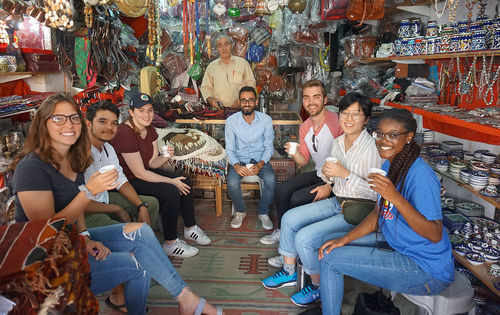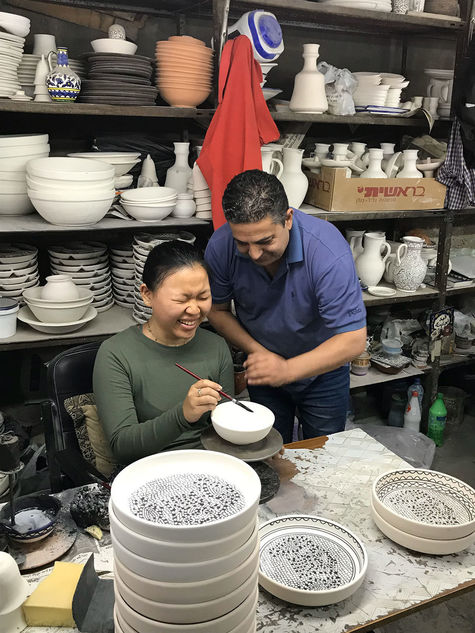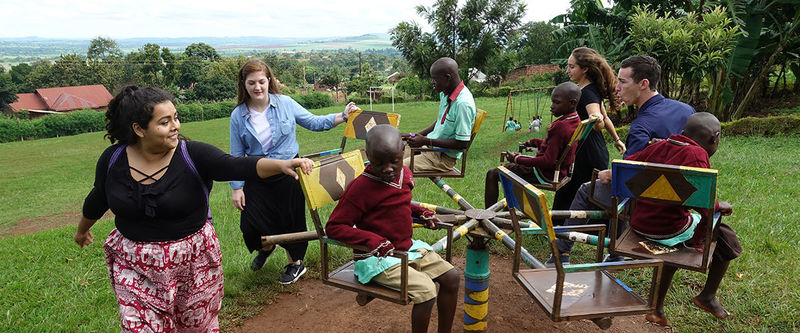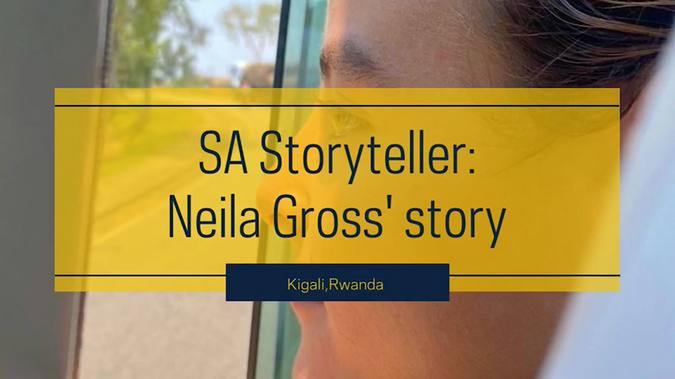In its mission statement, the University of Notre Dame makes it clear that it aims to “create a sense of human solidarity and concern for the common good that will bear fruit as learning becomes service to justice.” At Notre Dame Global, we strongly believe that few experiences can so well enable students to articulate this principle than taking part in meaningful, immersive community engagement during a semester abroad. As you explore our program selection and discern the best international opportunity for you, we encourage you to be mindful of the ways you can allow yourself to be deeply involved with your host community.
What is community engagement?
The Forum on Education Abroad defines community engagement as “A course, internship, program or experience that enhances academic learning through reciprocal relationships with communities that offer opportunities to advance critical thinking, develop civic skills, and address public problems.” In study abroad, this often involves the combination of coursework and volunteer work to immerse students into the local community while developing professional and personal skills. This can come in several forms; including a Community Based Learning (CBL) course at one of NDG’s global locations. CBL courses are an intentional way to integrate student learning in academic courses with community engagement. Based on reciprocal and mutually-beneficial partnerships between instructors, students, and community groups, the goal is to address community-identified needs and ultimately create positive social change. Outside of CBL courses, additional community engagement experiences can include volunteering within the local community while not earning academic credit. Each of these opportunities deepen students’ understanding of the community, enrich cultural learning—and where applicable—improve language skills.
Why should I consider community engagement during study abroad?

Community engagement encourages the development of intercultural and leadership skills in a real-world context. Through these experiences, students learn first-hand how local experts are addressing issues with the resources available and can apply that knowledge to their future endeavors. Community engagement provides students with a sense of empowerment deepening their insight into their host culture while simultaneously helping the community. Beyond the benefits from a student perspective, the local community benefits most when the Notre Dame community is invested in creating a long-term, reciprocal relationship. Through continued engagement with the local community every semester, our students play a crucial role in fostering this relationship with their host communities.
What does community engagement look like in a study abroad program?
Community engagement can take different forms in the context of study abroad. The most common form of community engagement abroad happens through structured CBL courses, often with a graded and an ungraded (field work) component. This structured approach enables students to engage with the host community with proper supervision, giving students the time and space to reflect and engage with others in the same course.
Some programs may offer structured opportunities for community engagement without a course, or academic credit. These may take the form of intensive week-long immersion trips or regularly scheduled weekly trips.
In some situations, students may have very particular interests in a specific cause and may reach out to local staff to get involved with their target cause of community of interest. While we encourage students to communicate their interests to our staff as early as possible, we generally discourage students that want to engage with the community as an after-thought or only when convenient to their schedules. We strongly believe the most meaningful and impactful experiences happen in a structured setting with trained professionals who can draw synergies between you and the community to maximize collective and individual gains from the experience.
Finally, it is important to note that most study abroad experiences through Notre Dame Global last for either a semester or summer. Many students recognize their time abroad is simply an exposition, or an introduction, to a community or a cause. Many students who are seriously committed to service will often return to their study abroad destination to continue their engagement with their cause or community of interest. Study abroad is not meant to be a confined experience -- it’s meant to be the start of a new outlook on the world.
Noteworthy Examples of Community Engagement in Study Abroad
The study abroad programs listed below offer extensive opportunities for community engagement. CBL courses are available in many Notre Dame study abroad locations, and where not available, there are often still opportunities for service and deep engagement in the local community.
Dublin
Dublin programs include a CBL component, which is part of the “Introduction to Ireland” required course. This allows a pre-selected group of students to formally commit 2-3 hours a week to a service site in Dublin.

Jerusalem
Jerusalem students have multiple opportunities for engagement via a CBL course or structured non-credit bearing service opportunities. Students can elect to take the for-credit CBL course which places them with a local NGO and includes guided reflections with on-site staff. Additionally, students can choose to volunteer their time with an organization with which Notre Dame Jerusalem has an ongoing partnership.
London
Through coursework or internships, service opportunities are ample in London. Coursework could allow students to work closely with community groups, exploring issues of heritage, identity, material culture, history, and belonging. Additionally, internships in Catholic social teaching include practical work experience in campaigning for social justice through a network of inner-city Catholic parishes in London.
Puebla
Fall pre-med students take a 3-credit S/U course, "The Theory and Practice of Mexican Medicine," which offers them first hand experience with the Mexican health system through clinical shadowing in public and private hospitals. Various group trips outside of Puebla expose students to rural clinics, health education, and traditional healing practices.
Spring students can take a CBL course at Ibero University earning Special Studies credit at Notre Dame by developing and implementing a participatory action research project that serves children at a local community organization.
Rome
All students enroll in a CBL course which facilitates and promotes meaningful civic engagement with the city of Rome. Examples of course topics include migrants and refugees crisis in Rome and the Italian Education system in a comparative perspective. Through independent research, interactions with experts in the field, and personal experiences as active members of a local organization, students will have the opportunity to engage with timely topics from multiple perspectives.
Santiago
Two optional community-based learning courses are offered - “Poverty and Development” and "God in Latin American Theology" - which provide students with opportunities to study the meaning and significance of poverty in Latin America from theological and social science perspectives and engage with local community organizations.
Stellenbosch
A special opportunity for service is available through the Global Service Learning course. This 3-credit course consists of in-class hours and on-site community engagement. The class covers theory on education, sustainable development, social justice, and community engagement, while the community engagement component takes place in a partner school or organization.
Toledo
Students have the opportunity to take a community engagement course pertaining to the immigration phenomenon in Spain, collaborating with local agencies that support the immigrant population.

